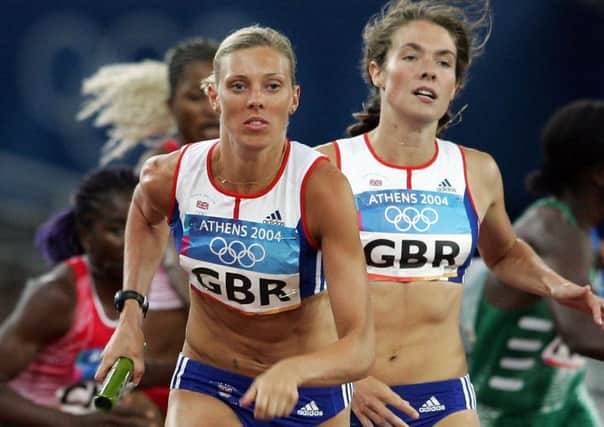Lee McConnell still pained by medals lost to drug cheats


It will be one of several such medal ceremonies held at the same Olympic Stadium that Ennis-Hill lit up in 2012, a year after being denied in Daegu, South Korea, by the now convicted blood doper Tatyana Chernova.
Scotland’s most decorated athlete of the past decade-and-a-half, Lee McConnell, has yet to receive a similar back- dated acknowledgement, despite a few compelling cases, but is adamant that, fleetingly nice as it would be, it would never make up for the frustration of missed glory moments.
Advertisement
Hide AdAdvertisement
Hide AdExcitement is building ahead of next month’s world championships but athletics remains a sport traumatised by the taint of cheating, with Russia still banned following exposure of the shocking, systematic state-sponsored extent of its doping programme.
Over her fine career, McConnell won three individual medals in 400m and 400m hurdles at Commonwealth Games and European Championships, plus an additional relay bronze at the latter and two world championship bronzes as part of the GB quartet in 2005 and 2007.
A prized Olympic gong is the obvious gap in that still impressive roll of honour.
McConnell ran alongside Donna Fraser, Catherine Murphy, and Christine Ohuruogu and finished fourth in the 4x400m relay at the 2004 Olympics in Athens. An American athlete, Crystal Cox, was later found guilty of doping offences. Cox, who ran in the heats but not the final, had her medal revoked but the US team did not.
“It kind of ran out of time because it had to be done within a certain time period,” said McConnell of the labyrinthine appeals process. “We never got upgraded even though one of the Americans was disqualified for being a drugs cheat. There was a lot of argument around it but it didn’t get dealt with quickly enough by the IAAF [international Association of Athletics Federations] and IOC [International Olympic Committee]. It’s disappointing obviously.
“At the moment I could still get upgrades to World Championships bronze [after GB finished fourth behind the Russians in the 2009 and 2011 4x400m relays] and a European Championship bronze to silver [from 2010]. But we don’t know what’s going to happen with that. There is just so much controversy at the moment surrounding the Russians. I don’t know where it’s going.”
Now 38, McConnell retired from the sport in 2014 after just failing in a brave bid to compete in the Glasgow Commonwealth Games less than a year after giving birth to her first son.
The team aspect of relays can make decisions to strip and upgrade more complicated but they do happen, with Usain Bolt famously losing his 2008 Beijing 4x100m relay gold after Jamaica team-mate Nesta Carter was found guilty of doping, and the GB quartet upgraded to bronze after finishing fourth behind the Russians in the men’s 4x400m at the same Olympics.Martyn Rooney, Andrew Steele, Robert Tobin and Michael Bingham received their bronze medals in the London Olympic Stadium at the Anniversary Games earlier this month.
Advertisement
Hide AdAdvertisement
Hide AdMcConnell was delighted to see that but stressed that such gestures don’t come close to making up for devastation of being cheated out of hard-worked-for success.
“It was fantastic seeing the boys get their medal the other week but, even if I was to get something like that, it wouldn’t be the same,” she said. “There is so much lost. You’re losing that moment but also a lot of confidence.
“When you just miss out on medals like that you start to doubt yourself and think ‘I’m not good enough’ but the truth is you are good enough, it’s just that other people have cheated to get ahead of you. That plays on your mind and it dents your confidence, changes how you go about things. You train too hard maybe to overcompensate and pick up injuries.
“There is money lost financially, too, as medals can lead to extra funding and sponsorship. And you can miss out on getting entry to some of the big races on the circuit the following year, which you might not if you were, say, an Olympic medallist.
“Invites to those big races help you plan your season, give you a better chance of peaking at the right time.
“Cheating really needs to be stamped out of our sport. Banning Russia was a big step but I think more needs to be done.”